人教版(2019)必修第一册Unit 5 Languages around the world Language points 课件(共34张)
文档属性
| 名称 | 人教版(2019)必修第一册Unit 5 Languages around the world Language points 课件(共34张) |  | |
| 格式 | zip | ||
| 文件大小 | 4.6MB | ||
| 资源类型 | 教案 | ||
| 版本资源 | 人教版(2019) | ||
| 科目 | 英语 | ||
| 更新时间 | 2022-09-01 20:41:32 | ||
图片预览

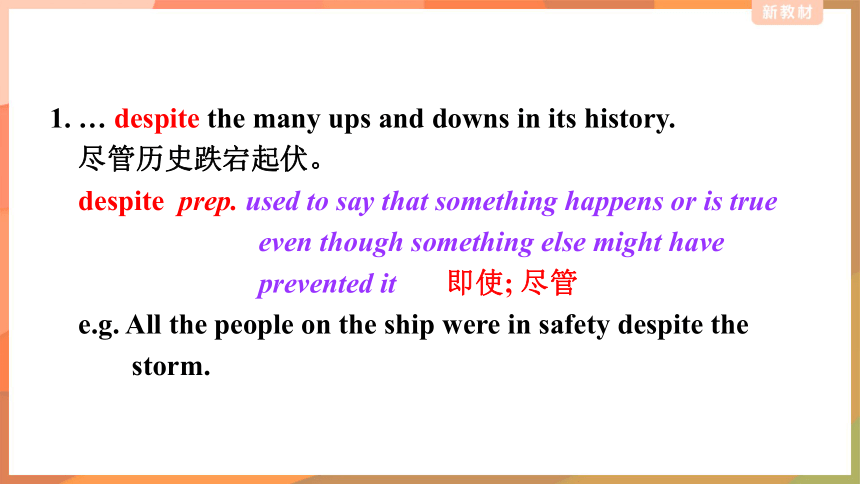
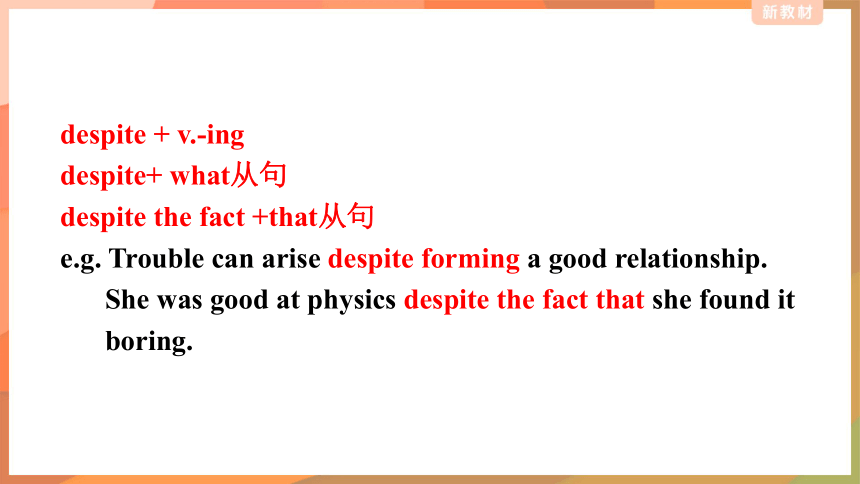
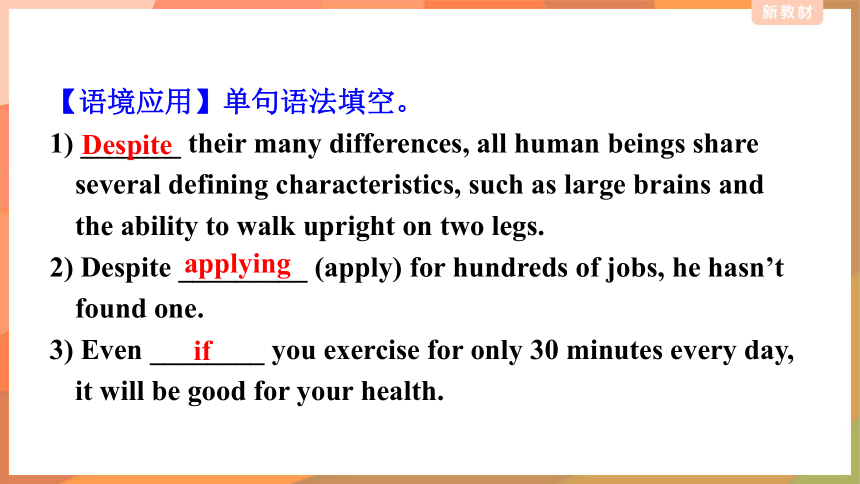
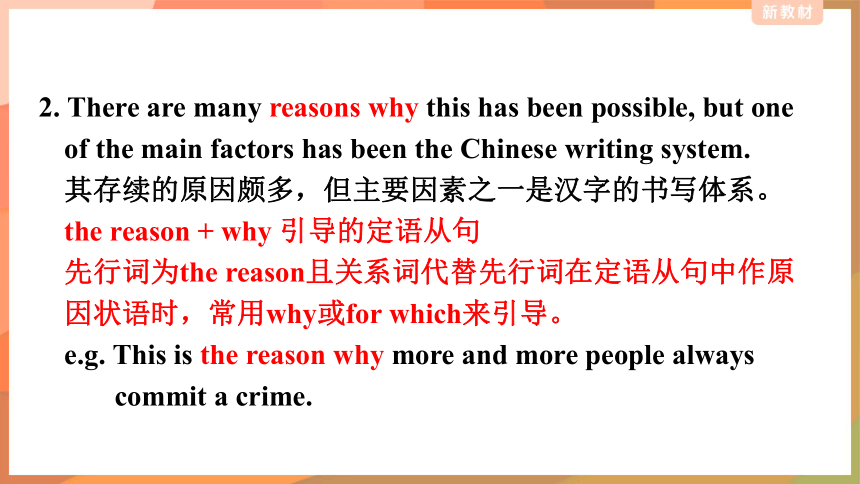
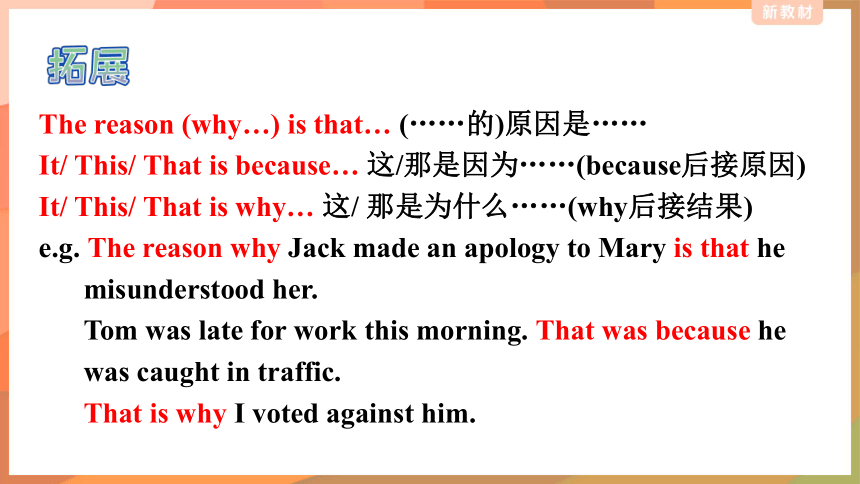
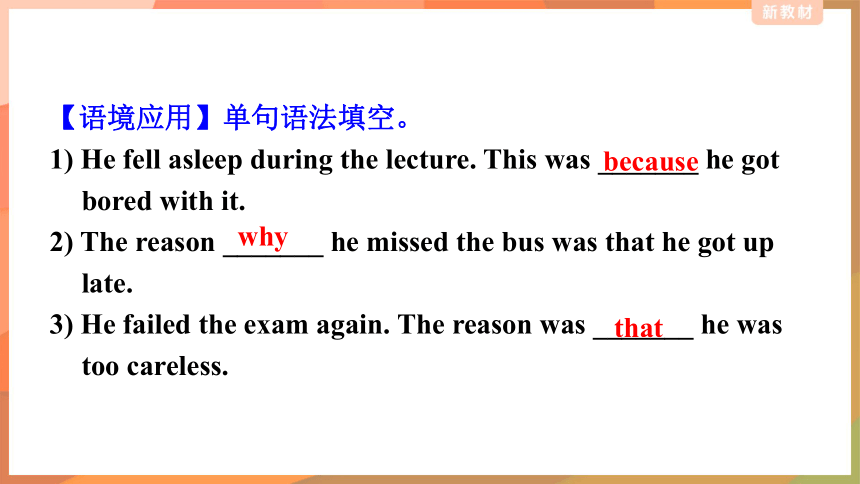
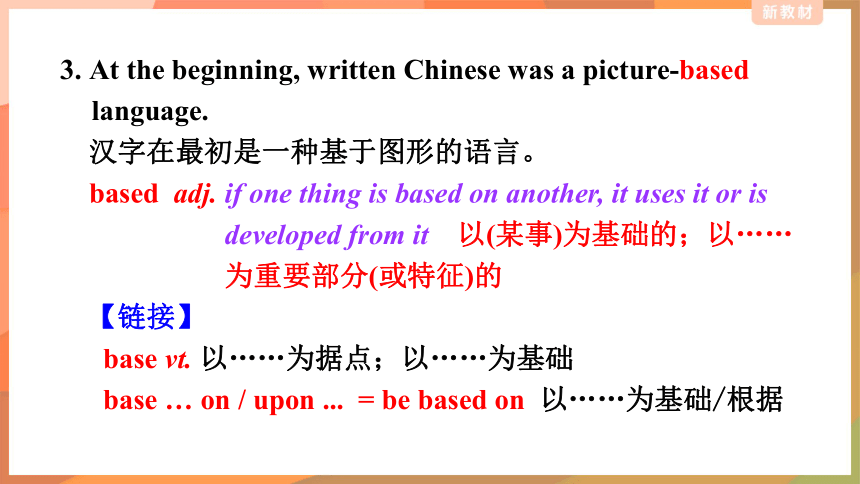
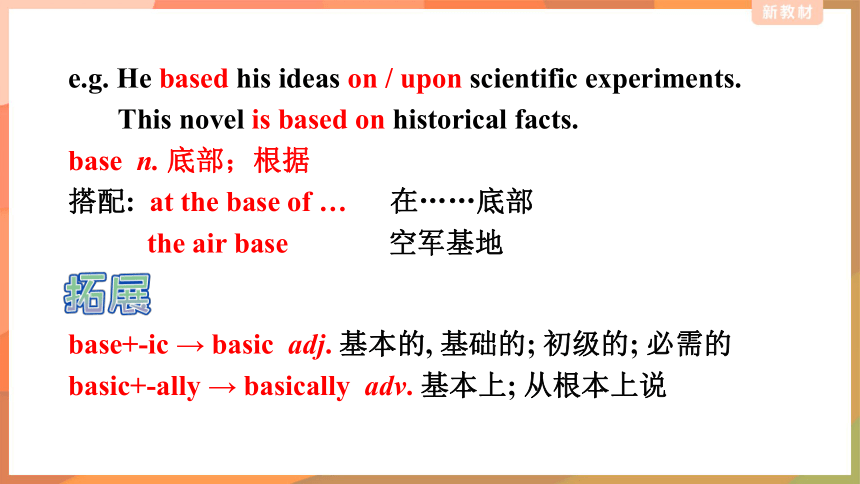
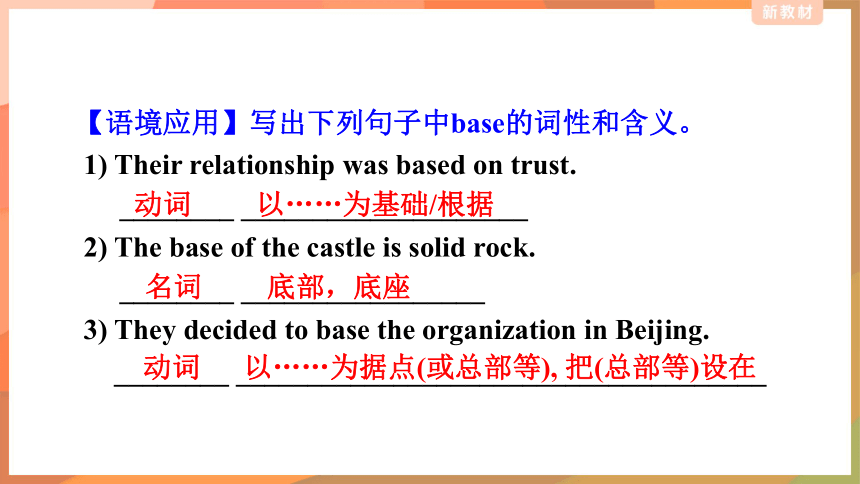
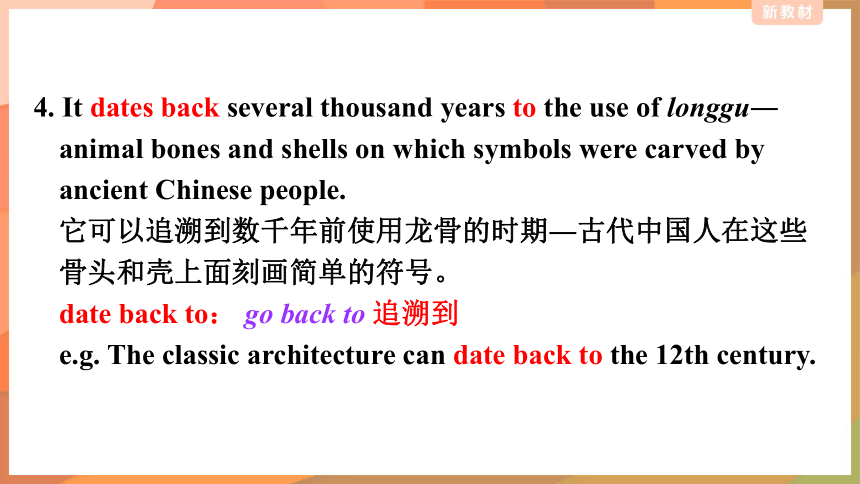
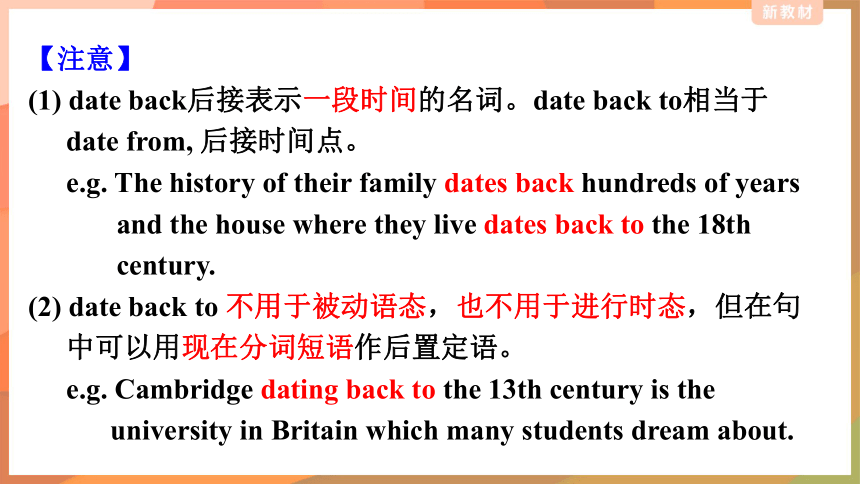
文档简介
(共34张PPT)
1. … despite the many ups and downs in its history.
尽管历史跌宕起伏。
despite prep. used to say that something happens or is true even though something else might have prevented it 即使; 尽管
e.g. All the people on the ship were in safety despite the storm.
despite + v.-ing
despite+ what从句
despite the fact +that从句
e.g. Trouble can arise despite forming a good relationship.
She was good at physics despite the fact that she found it boring.
【语境应用】单句语法填空。
1) _______ their many differences, all human beings share several defining characteristics, such as large brains and the ability to walk upright on two legs.
2) Despite _________ (apply) for hundreds of jobs, he hasn’t found one.
3) Even ________ you exercise for only 30 minutes every day, it will be good for your health.
Despite
applying
if
2. There are many reasons why this has been possible, but one of the main factors has been the Chinese writing system.
其存续的原因颇多,但主要因素之一是汉字的书写体系。
the reason + why 引导的定语从句
先行词为the reason且关系词代替先行词在定语从句中作原因状语时,常用why或for which来引导。
e.g. This is the reason why more and more people always commit a crime.
The reason (why…) is that… (……的)原因是……
It/ This/ That is because… 这/那是因为……(because后接原因)
It/ This/ That is why… 这/ 那是为什么……(why后接结果)
e.g. The reason why Jack made an apology to Mary is that he misunderstood her.
Tom was late for work this morning. That was because he was caught in traffic.
That is why I voted against him.
【语境应用】单句语法填空。
1) He fell asleep during the lecture. This was _______ he got bored with it.
2) The reason _______ he missed the bus was that he got up late.
3) He failed the exam again. The reason was _______ he was too careless.
because
why
that
3. At the beginning, written Chinese was a picture-based language.
汉字在最初是一种基于图形的语言。
based adj. if one thing is based on another, it uses it or is developed from it 以(某事)为基础的;以……为重要部分(或特征)的
【链接】
base vt. 以……为据点;以……为基础
base … on / upon ... = be based on 以……为基础/根据
e.g. He based his ideas on / upon scientific experiments.
This novel is based on historical facts.
base n. 底部;根据
搭配: at the base of … 在……底部
the air base 空军基地
base+-ic → basic adj. 基本的, 基础的; 初级的; 必需的
basic+-ally → basically adv. 基本上; 从根本上说
【语境应用】写出下列句子中base的词性和含义。
1) Their relationship was based on trust.
________ ____________________
2) The base of the castle is solid rock.
________ _________________
3) They decided to base the organization in Beijing. ________ _____________________________________
名词 底部,底座
动词 以……为基础/根据
动词 以……为据点(或总部等), 把(总部等)设在
4. It dates back several thousand years to the use of longgu― animal bones and shells on which symbols were carved by ancient Chinese people.
它可以追溯到数千年前使用龙骨的时期―古代中国人在这些骨头和壳上面刻画简单的符号。
date back to: go back to 追溯到
e.g. The classic architecture can date back to the 12th century.
【注意】
(1) date back后接表示一段时间的名词。date back to相当于date from, 后接时间点。
e.g. The history of their family dates back hundreds of years and the house where they live dates back to the 18th century.
(2) date back to 不用于被动语态,也不用于进行时态,但在句中可以用现在分词短语作后置定语。
e.g. Cambridge dating back to the 13th century is the university in Britain which many students dream about.
【语境应用】单句语法填空。
1) All the objects are from the same excavation site in Sanxingdui and can be dated back _________ between 3000 and 5000 years ago.
2) The old building _________ (date) back to the Tang Dynasty is still in good condition.
3) it’s a tradition that _________ (date) back at least 300 years.
to
dating
dates
5. Emperor Qinshihuang united the seven major states into one unified country where the Chinese writing system began to develop in one direction.秦始皇统一七个诸侯国 后,在这个统一的国家里,汉字开始朝着一个方向发展。
major adj. very large or important, when compared to other things or people of a similar kind
主要的; 重要的; 大的
e.g. The government’s major concern is with preventing road accidents.
Smoking is one of the major causes of cancer.
n. the main subject that a student studies at college or university 主修课程
someone studying a particular subject as their main subject at college or university 主修学生
e.g. What is your major, English or French
She is a history major.
vi. to study something as your main subject at college or university 主修
major in 主修……
e.g. Laura is majoring in physics.
to pay particular attention to one subject or thing 专门研究
e.g. The company is planning to major on offering the machines we need.
majority n. 大多数 ;大半
the majority of … 大多数……
【语境应用】单句语法填空。
1) Li Ming wants to major _______ physics at college.
2) One-third of the country is covered with trees and the ________ (major) of the citizens are natives.
in
majority
6. That writing system was of great importance in uniting the Chinese people and culture.
这个书写体系对于中国人民与中国文化的统一具有非凡的意义。
was of great importance属于“be of+抽象名词”结构,相当于was very important。
be of +抽象名词
(1) 可以转化为同根形容词的
“be of +抽象名词”用来说明句子主语所具有的作用、重要性或意义等。这类名词有value, use, importance, help, significance, benefit等。名词前可用no, some, any, little, much, great等修饰。
(2) 不可以转化为同根形容词的
“be of+抽象名词”结构用来说明句子主语在重量、大小、颜色、类别等方面的特征。这类名词有color, size, age, height, weight, shape, type, kind, price, quality等,名词前可用different, the same, a(n)等来修饰。
e.g. These pens are of many different colors.
Your suitcase is of the same size with mine.
【语境应用】完成句子。
1) Children need friends __________________ (与他们同龄的) to play with.
2) It’s necessary to be prepared for a job interview. Having the answers ready will _____________________________ (很有帮助).
3) Although it is a second-hand table, ______________________ ______________ (它非常有价值).
of their own age
be of great help/ be very helpful
it’s of great value/ it’s very valuable
7. Even today, no matter where Chinese people live or what dialect they speak, they can all still communicate in writing.
即使在今天,不论住在哪里,也不论说何种方言,中国人仍然能通过书写(汉字)进行交流。
no matter where为no matter +疑问词结构,“不论……;不管……”
“no matter + 疑问词”引导让步状语从句。
no matter:不管,无论,与what/ who/ when/ where/ how等疑问词连用,引导让步状语从句,相当于whatever/ whoever/ whenever/ wherever/ however等。
e.g. No matter how complicated the situation was, he could deal with it successfully.
No matter what happens, I’ll always be there for you!
No matter where I want to go, it must be quiet and could make me regain the strength.
【注意】
whatever, whichever, whoever既可以引导让步状语从句,又可以引导名词性从句,引导名词性从句时, 不可以替换为“no matter+ what/ which/ who”形式。
e.g. Whatever David says sounds right to Helen. That’s why she has made up her mind to be with him whatever/ no matter what happens.
【语境应用】完成句子。
1) 不管在哪里,他都养成了早餐前散步的习惯。
________________________________, he makes it a rule to go for a walk before breakfast.
2) 无论发生什么,我们都必须保持镇定。
________________________________, we must keep calm.
No matter where/ Wherever he is
Whatever/ No matter what happened
8. The high regard for the Chinese writing system can be seen in the development of Chinese characters as an art form, known as Chinese calligraphy, …
中国人对其书写体系推崇备至,这体现在汉字发展为一种艺术形式―书法,……
regard n. respect and admiration for someone or something 尊重
attention or consideration that is shown towards someone or something 关注
[常pl.] greetings 问候; 致意
have a high regard for 钦佩……
hold sb./sth. in high regard 敬重……
give one’s regards to 代某人向……问候
with/in regard to 关于;有关
e.g. I have a high regard for Tom because he's so wonderful.
Please give my regards to your parents
Please give my regards to your parents.
vt. to think about someone or something in a particular way
把……视为;看待
regard…as 把……看作;认为……是
e.g. We always regard him as a friend, but he showed his colours in the current emergency.
regarding prep. 关于;有关
【语境应用】语法填空。
1) Please give my __________ (regard) to your mother if you see her.
2) He has no regard ________ other people’s feeling.
3) Mountains are regarded ________ spiritual places by many cultures.
regards
for
as
9. …, an increasing number of international students are beginning to appreciate China’s culture and history through this amazing language.
……,越来越多的国际学生开始通过汉语这一奇妙的语言欣赏中国的文化和历史。
appreciate vt. to understand how good or useful someone or something is 欣赏; 重视
to be grateful for sth. that sb. has done 感激
to understand that sth. is true 领会
vi. to increase in value over a period of time增值
appreciate (one’s) doing sth. 感激(某人)做某事
I would appreciate it if… 如果……我将不胜感激
e.g. We appreciate your helping us.
I would appreciate it if you could point out my shortcomings.
Houses will appreciate in value.
【注意】
1) appreciate后面只能接“事”作宾语,不 能接“人”作宾语。
2) appreciate后不接to do作宾语, 也不能直接跟从句, 需先接形式宾语it, 再接从句, 构成 I would appreciate it if …句型。
appreciation n. 感激
show appreciation to 向……表示感谢
in appreciation of/ for… 感谢……
【语境应用】翻译句子。
1) You can’t really appreciate foreign literature in translation.
2) We didn't appreciate that he was seriously ill.
3) I’d appreciate it if you would turn the radio down.
看翻译作品不能真正欣赏到外国文学原著的美妙之处。
我们没有意识到他的病情很严重。
如果你把收音机的音量调低一些,我会不胜感激。
1. … despite the many ups and downs in its history.
尽管历史跌宕起伏。
despite prep. used to say that something happens or is true even though something else might have prevented it 即使; 尽管
e.g. All the people on the ship were in safety despite the storm.
despite + v.-ing
despite+ what从句
despite the fact +that从句
e.g. Trouble can arise despite forming a good relationship.
She was good at physics despite the fact that she found it boring.
【语境应用】单句语法填空。
1) _______ their many differences, all human beings share several defining characteristics, such as large brains and the ability to walk upright on two legs.
2) Despite _________ (apply) for hundreds of jobs, he hasn’t found one.
3) Even ________ you exercise for only 30 minutes every day, it will be good for your health.
Despite
applying
if
2. There are many reasons why this has been possible, but one of the main factors has been the Chinese writing system.
其存续的原因颇多,但主要因素之一是汉字的书写体系。
the reason + why 引导的定语从句
先行词为the reason且关系词代替先行词在定语从句中作原因状语时,常用why或for which来引导。
e.g. This is the reason why more and more people always commit a crime.
The reason (why…) is that… (……的)原因是……
It/ This/ That is because… 这/那是因为……(because后接原因)
It/ This/ That is why… 这/ 那是为什么……(why后接结果)
e.g. The reason why Jack made an apology to Mary is that he misunderstood her.
Tom was late for work this morning. That was because he was caught in traffic.
That is why I voted against him.
【语境应用】单句语法填空。
1) He fell asleep during the lecture. This was _______ he got bored with it.
2) The reason _______ he missed the bus was that he got up late.
3) He failed the exam again. The reason was _______ he was too careless.
because
why
that
3. At the beginning, written Chinese was a picture-based language.
汉字在最初是一种基于图形的语言。
based adj. if one thing is based on another, it uses it or is developed from it 以(某事)为基础的;以……为重要部分(或特征)的
【链接】
base vt. 以……为据点;以……为基础
base … on / upon ... = be based on 以……为基础/根据
e.g. He based his ideas on / upon scientific experiments.
This novel is based on historical facts.
base n. 底部;根据
搭配: at the base of … 在……底部
the air base 空军基地
base+-ic → basic adj. 基本的, 基础的; 初级的; 必需的
basic+-ally → basically adv. 基本上; 从根本上说
【语境应用】写出下列句子中base的词性和含义。
1) Their relationship was based on trust.
________ ____________________
2) The base of the castle is solid rock.
________ _________________
3) They decided to base the organization in Beijing. ________ _____________________________________
名词 底部,底座
动词 以……为基础/根据
动词 以……为据点(或总部等), 把(总部等)设在
4. It dates back several thousand years to the use of longgu― animal bones and shells on which symbols were carved by ancient Chinese people.
它可以追溯到数千年前使用龙骨的时期―古代中国人在这些骨头和壳上面刻画简单的符号。
date back to: go back to 追溯到
e.g. The classic architecture can date back to the 12th century.
【注意】
(1) date back后接表示一段时间的名词。date back to相当于date from, 后接时间点。
e.g. The history of their family dates back hundreds of years and the house where they live dates back to the 18th century.
(2) date back to 不用于被动语态,也不用于进行时态,但在句中可以用现在分词短语作后置定语。
e.g. Cambridge dating back to the 13th century is the university in Britain which many students dream about.
【语境应用】单句语法填空。
1) All the objects are from the same excavation site in Sanxingdui and can be dated back _________ between 3000 and 5000 years ago.
2) The old building _________ (date) back to the Tang Dynasty is still in good condition.
3) it’s a tradition that _________ (date) back at least 300 years.
to
dating
dates
5. Emperor Qinshihuang united the seven major states into one unified country where the Chinese writing system began to develop in one direction.秦始皇统一七个诸侯国 后,在这个统一的国家里,汉字开始朝着一个方向发展。
major adj. very large or important, when compared to other things or people of a similar kind
主要的; 重要的; 大的
e.g. The government’s major concern is with preventing road accidents.
Smoking is one of the major causes of cancer.
n. the main subject that a student studies at college or university 主修课程
someone studying a particular subject as their main subject at college or university 主修学生
e.g. What is your major, English or French
She is a history major.
vi. to study something as your main subject at college or university 主修
major in 主修……
e.g. Laura is majoring in physics.
to pay particular attention to one subject or thing 专门研究
e.g. The company is planning to major on offering the machines we need.
majority n. 大多数 ;大半
the majority of … 大多数……
【语境应用】单句语法填空。
1) Li Ming wants to major _______ physics at college.
2) One-third of the country is covered with trees and the ________ (major) of the citizens are natives.
in
majority
6. That writing system was of great importance in uniting the Chinese people and culture.
这个书写体系对于中国人民与中国文化的统一具有非凡的意义。
was of great importance属于“be of+抽象名词”结构,相当于was very important。
be of +抽象名词
(1) 可以转化为同根形容词的
“be of +抽象名词”用来说明句子主语所具有的作用、重要性或意义等。这类名词有value, use, importance, help, significance, benefit等。名词前可用no, some, any, little, much, great等修饰。
(2) 不可以转化为同根形容词的
“be of+抽象名词”结构用来说明句子主语在重量、大小、颜色、类别等方面的特征。这类名词有color, size, age, height, weight, shape, type, kind, price, quality等,名词前可用different, the same, a(n)等来修饰。
e.g. These pens are of many different colors.
Your suitcase is of the same size with mine.
【语境应用】完成句子。
1) Children need friends __________________ (与他们同龄的) to play with.
2) It’s necessary to be prepared for a job interview. Having the answers ready will _____________________________ (很有帮助).
3) Although it is a second-hand table, ______________________ ______________ (它非常有价值).
of their own age
be of great help/ be very helpful
it’s of great value/ it’s very valuable
7. Even today, no matter where Chinese people live or what dialect they speak, they can all still communicate in writing.
即使在今天,不论住在哪里,也不论说何种方言,中国人仍然能通过书写(汉字)进行交流。
no matter where为no matter +疑问词结构,“不论……;不管……”
“no matter + 疑问词”引导让步状语从句。
no matter:不管,无论,与what/ who/ when/ where/ how等疑问词连用,引导让步状语从句,相当于whatever/ whoever/ whenever/ wherever/ however等。
e.g. No matter how complicated the situation was, he could deal with it successfully.
No matter what happens, I’ll always be there for you!
No matter where I want to go, it must be quiet and could make me regain the strength.
【注意】
whatever, whichever, whoever既可以引导让步状语从句,又可以引导名词性从句,引导名词性从句时, 不可以替换为“no matter+ what/ which/ who”形式。
e.g. Whatever David says sounds right to Helen. That’s why she has made up her mind to be with him whatever/ no matter what happens.
【语境应用】完成句子。
1) 不管在哪里,他都养成了早餐前散步的习惯。
________________________________, he makes it a rule to go for a walk before breakfast.
2) 无论发生什么,我们都必须保持镇定。
________________________________, we must keep calm.
No matter where/ Wherever he is
Whatever/ No matter what happened
8. The high regard for the Chinese writing system can be seen in the development of Chinese characters as an art form, known as Chinese calligraphy, …
中国人对其书写体系推崇备至,这体现在汉字发展为一种艺术形式―书法,……
regard n. respect and admiration for someone or something 尊重
attention or consideration that is shown towards someone or something 关注
[常pl.] greetings 问候; 致意
have a high regard for 钦佩……
hold sb./sth. in high regard 敬重……
give one’s regards to 代某人向……问候
with/in regard to 关于;有关
e.g. I have a high regard for Tom because he's so wonderful.
Please give my regards to your parents
Please give my regards to your parents.
vt. to think about someone or something in a particular way
把……视为;看待
regard…as 把……看作;认为……是
e.g. We always regard him as a friend, but he showed his colours in the current emergency.
regarding prep. 关于;有关
【语境应用】语法填空。
1) Please give my __________ (regard) to your mother if you see her.
2) He has no regard ________ other people’s feeling.
3) Mountains are regarded ________ spiritual places by many cultures.
regards
for
as
9. …, an increasing number of international students are beginning to appreciate China’s culture and history through this amazing language.
……,越来越多的国际学生开始通过汉语这一奇妙的语言欣赏中国的文化和历史。
appreciate vt. to understand how good or useful someone or something is 欣赏; 重视
to be grateful for sth. that sb. has done 感激
to understand that sth. is true 领会
vi. to increase in value over a period of time增值
appreciate (one’s) doing sth. 感激(某人)做某事
I would appreciate it if… 如果……我将不胜感激
e.g. We appreciate your helping us.
I would appreciate it if you could point out my shortcomings.
Houses will appreciate in value.
【注意】
1) appreciate后面只能接“事”作宾语,不 能接“人”作宾语。
2) appreciate后不接to do作宾语, 也不能直接跟从句, 需先接形式宾语it, 再接从句, 构成 I would appreciate it if …句型。
appreciation n. 感激
show appreciation to 向……表示感谢
in appreciation of/ for… 感谢……
【语境应用】翻译句子。
1) You can’t really appreciate foreign literature in translation.
2) We didn't appreciate that he was seriously ill.
3) I’d appreciate it if you would turn the radio down.
看翻译作品不能真正欣赏到外国文学原著的美妙之处。
我们没有意识到他的病情很严重。
如果你把收音机的音量调低一些,我会不胜感激。
